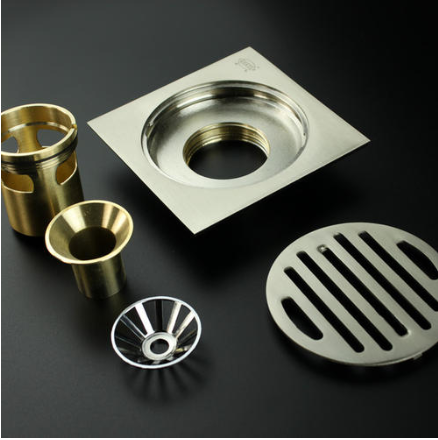Appearance treatment of copper fittings
1. Chemical treatment
The first thing is to use acidic or alkaline solution to react with oxide Bai and oil on the surface of the workpiece to dissolve it in acidic or alkaline solution to remove rust, oxide scale and oil on the surface of the workpiece. Then use nylon brush roller or 304 stainless steel wire (acid and alkali resistant solution made of steel wire brush roller) to clean up, and you can reach the destination.
2. Mechanical treatment
It mainly includes wire brush roller polishing method, shot blasting method and shot peening method.
The polishing method is that the brush roller is driven by the motor, and the brush roller rotates at high speed on the upper and lower surface of the strip in the opposite direction of the rolling piece movement to brush off the oxide scale. The iron oxide scale should be washed out by closing the circulating cooling water flushing system.
Shot blasting finishing is a method of using centrifugal force to accelerate the shot and shoot it to the workpiece for derusting finishing. However, due to the poor flexibility of shot blasting, limited by the site, there is some blindness in finishing the workpiece, and it is easy to produce a dead angle in the inner and outer surface of the workpiece. The equipment structure is disordered, there are many vulnerable parts, especially the blade and other parts wear quickly, there are many maintenance man hours, high cost and large one-time investment.

Shot peening is used for surface treatment, which has strong striking force and obvious finishing effect. However, shot peening is easy to deform the sheet workpiece, and the metal substrate is deformed when the steel shot hits the surface of the workpiece (no matter shot blasting or shot peening).
Because Fe3O4 and Fe2O3 have no plasticity, they peel off after crushing, and the oil film deforms together with the material, so shot blasting and shot peening can not remove the oil stain on the workpiece with oil stain.
3. Electrochemical method
This method is to use the electrode response to form a coating on the surface of the workpiece. The first way is to:
Electroplating: in the electrolyte solution, the workpiece as the cathode, under the effect of external current, make its surface constitute a coating process, known as electroplating. The coating can be metal, alloy, semiconductor or containing all kinds of solid particles, such as copper plating, nickel plating, etc.
Oxidation: in the electrolyte solution, the workpiece is the anode. Under the effect of external current, the process of forming an oxidation film on the surface of the workpiece is called anodizing, such as anodizing of aluminum alloy.
The oxidation treatment of steel can be carried out by chemical or electrochemical methods. The chemical method is to put the workpiece into the oxidation solution, relying on the chemical effect to form an oxide film on the surface of the workpiece, such as the bluing treatment of steel.
Article from: bathroom copper accessories manufacturers http://www.jmyilin.com/
-
04-18
ISH 2025 Concludes with Great Success – Yilin Participated in the Global Event
The ISH 2025 trade fair successfully concluded on March 21, 2025, at Messe Frankfurt. With over 2,000 exhibitors and more than 160,000 visitors from 154 countries, the event reaffirmed its status as the world’s leading platform for HVAC and water technologies.Under the theme “Solutions for a Susta
-
11-22
Exhibition for YILIN
Yilin Precision will soon attend an exhibition in Warsaw, Poland. Warmly Welcome to visit our booth.Exhibition time: 24th-26th November, Poland Time, 10:00-17:00;Booth Q04,Hall F3Website:www.jmyilin.com/en
-
01-12
What are the types of bathroom accessories?
The hardware used in the bathroom mainly includes towel rack, towel rack, towel ring, paper towel rack, storage rack, soap box, etc. Due to the frequent use of family bathroom, hardware is necessary to be able to withstand high temperature, high humidity and other "severe test". Now the bathroom hardware on the market is mainly pure copper, copper zinc alloy, stainless steel and alumina. In the meantime, the hardware of pure copper and copper zinc alloy are mostly chrome plated, while
-
01-12
Appearance treatment of copper fittings
1. Chemical treatment is mainly to use acidic or alkaline solution to react with oxide Bai and oil stain on the surface of the workpiece to dissolve them in acidic or alkaline solution, so as to remove rust, oxide scale and oil stain on the surface of the workpiece, and then use brush roller made of nylon or 304 stainless steel wire (steel wire brush roller made of acid and alkali resistant solution) to clean up and reach the desired result. 2. Mechanical treatment mainly includes wire brush rol